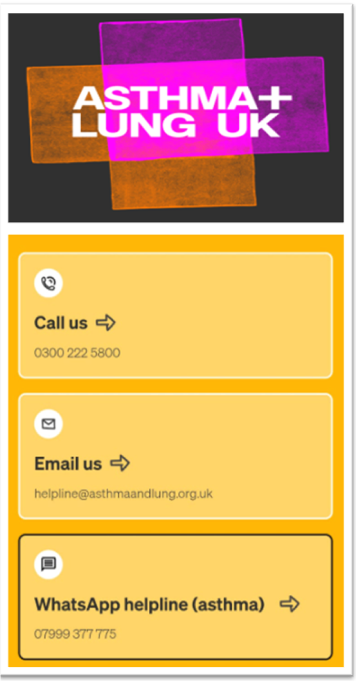Help with Long Term Conditions

Asthma & Lung UK
The helpline team is trained to give you information on many aspects of living with a lung condition. We'll lend you a caring ear when you need it.
We'll take the time to talk things through with you, and explore any social and practical difficulties you might have. You don’t have to face living with a lung condition on your own.
Calling us is always completely confidential. We're here for you whether you're affected by a lung condition – including families, friends and carers – or worried about your lung health.
You can talk to us about anything - from how to manage your condition, to going on holiday. Or just to say hello.
Here are some of the things we've spoken to people about recently:
- Advice, support and guidance on how to manage your condition
- Information about specific conditions
- Options about medication and treatments
- What diet or exercise might be appropriate
- Helping people to understand and accept their diagnosis
- Learning how to manage flare –ups
- How to arrange oxygen for holidays abroad
- Advice on government financial help available through welfare benefits, grants, funding as well as fuel poverty
We don’t have access to your medical records, so you may need to go back to your health care team for answers to some questions. And we can't diagnose you or comment on the results of any test or investigations. If you have questions like this, you should talk to a local health care professional.
We can only provide advice on the treatment and management of conditions in the UK.
#AskAboutAsthma 2024:
Helping children and young people to live their best lives #AskAboutAsthma returns for its eighth year in September 2024.
The campaign encourages simple changes to children and young people’s care that will make a big difference to how they experience their asthma. The 2024 #AskAboutAsthma campaign will run from 9 – 15 September, ahead of the rise in asthma attacks in September when students go back to school after their summer holidays. The campaign is run by the NHS England – London Babies, Children and Young People’s Transformation team and each year sees cross-sector support including healthcare, education, local authorities, VCSE and London region partners. This year’s theme is focusing on helping children and young people with asthma to live their best lives. Asthma should not limit children and young people’s lives in any way and good asthma control means having no symptoms.
AskAboutAsthma promotes getting these four asks in place:
1. get an asthma action plan in place.
2. understand how to use inhalers correctly.
3. schedule an asthma review every year and after every attack.
4. consider air pollution and its impact on lung health – every asthma conversation should include indoor and outdoor air pollution.
Visit the 2024 campaign webpage for more information and resources to help you share the campaign.

Seven steps to living well with long term respiratory conditions this winter
One in five people are affected by a respiratory condition like COPD or asthma. As winter approaches, the colder weather can worsen symptoms. But there are some steps you can take to help yourself to stay as healthy as possible and manage your condition:
- Taking immediate actions if you have a flare-up
If you experience symptoms such as increased breathlessness, more frequent coughing, a change in mucus colour or consistency, or a fever, seek medical advice promptly. Early treatment can result in quicker recovery. For severe symptoms, call 999.
- Don’t forget your management plan
If you have a management plan from your GP, pharmacist, or respiratory team, make sure you adhere to it. If you have a 'rescue pack' of medication at home for flare-ups, contact your GP or COPD team within two days of starting treatment to discuss further steps. If you don’t have a plan, ask your healthcare provider for one.
- Medication essentials
Familiarise yourself with your regular medications and how to use them correctly. If unsure about inhaler technique, consult your local pharmacist. Instructional videos are also available on the Asthma + Lung UK website. Make sure to have a 2-week supply of in-date medication. You can register for online GP services and use the NHS App for easier management of repeat prescriptions
- Protect yourself against viruses
If you have a long-term respiratory condition, you qualify for FREE flu and COVID-19 vaccinations. These can be lifesaving for individuals with pre-existing conditions. For more details, visit our winter vaccinations page.
- Consider the pneumococcal vaccine
This one-off vaccine is available for those over 65 or with long-term respiratory issues. It can protect you from pneumonia, meningitis, sepsis and other illness such as sinusitis and earache. You can confirm your eligibility with your GP.
- Keep warm and keep active
If you have long term respiratory condition, it is especially important that you keep warm in winter. If you are struggling to afford heating to keep your home warm, Warm Homes Essex has some great advice and information that can support you to reduce their energy costs and impact on the environment. Here you'll find a range of government approved schemes that could also help.
Staying active is a great way to help you to keep warm and healthy. Find local resources to help you stay active this winter at: Stay active and healthy during the winter months - Mid and South Essex Integrated Care System (ics.nhs.uk)
For ideas, support and inspiration to keep you active - from others living with long term conditions, visit we are undefeatable Home - We Are Undefeatable
- Think about how you can help yourself
Lifestyle changes, such as quitting smoking, can enhance your lung capacity and overall health. For more information, reach out to our local lifestyle services for information and support.
For more advice on taking care of your respiratory health, Ruth Barlow, local clinical lead for Mid and South Essex Integrated Care System has written a blog with some advice and tips: Living with lung conditions - Mid and South Essex Integrated Care System (ics.nhs.uk)
Page created: 29 September 2022
